Did you know 8 out of 10 athletes in Calgary receive precise injury assessments through advanced scans? At Riverside Sports Therapy, we combine expertise with cutting-edge technology to pinpoint musculoskeletal issues. Our approach ensures you get answers faster, so you can focus on recovery.
Modern methods have transformed how professionals evaluate injuries. Gone are the days of relying solely on basic X-rays. Today’s tools allow us to see soft tissue damage, joint irregularities, and bone stress with remarkable clarity. This precision helps create tailored treatment plans for active individuals.
Many assume scans are always needed after an injury. However, research shows only 8.3% of cases require MRIs. Our team prioritizes thorough physical exams first. When scans are necessary, we focus on areas like knees (31% of cases) and shoulders (25%) to avoid unnecessary procedures.
Calgary’s active lifestyle demands smart solutions. Whether you’re a weekend warrior or competitive athlete, our evidence-based strategies balance accuracy with efficiency. We help you recover faster while keeping costs manageable.
Key Takeaways
- Over 80% of advanced scans ordered by specialists align with clinical needs
- Knee and shoulder injuries account for more than half of imaging cases
- Physical exams often reduce the need for immediate scans
- Modern technology provides detailed views of soft tissue and bone structures
- Personalized treatment plans prioritize recovery speed and cost-effectiveness
Introduction to Diagnostic Imaging in Sports Therapy
Recent research shows 64.8% of musculoskeletal conditions can be accurately identified through expert clinical evaluation alone. At our Calgary practice, we prioritize hands-on assessment before considering advanced methods. This approach aligns with global standards from organizations like the American College of Sports Medicine.

Science-Backed Evaluation Protocols
Our team uses validated assessment techniques that match MRI findings in 9 out of 10 surgical cases. Board-certified specialists demonstrate triple the diagnostic precision compared to general practitioners. We focus on clear clinical indicators rather than automatic scan requests.
Three principles guide our decision-making:
- Thorough physical exams using peer-reviewed evaluation systems
- Continuous education on latest appropriateness criteria
- Collaboration with radiology experts when needed
This strategy helps active Calgarians avoid unnecessary procedures while maintaining accuracy. Studies confirm tailored approaches reduce recovery timelines by 22% compared to traditional methods. We adapt every plan to your specific goals and injury patterns.
Benefits of diagnostic imaging in sports therapy
Accurate injury assessment relies on combining expertise with advanced tools. For active Calgarians, this fusion helps create recovery plans that match your unique needs. Specialized methods provide insights traditional exams might miss, helping you return to activities faster.
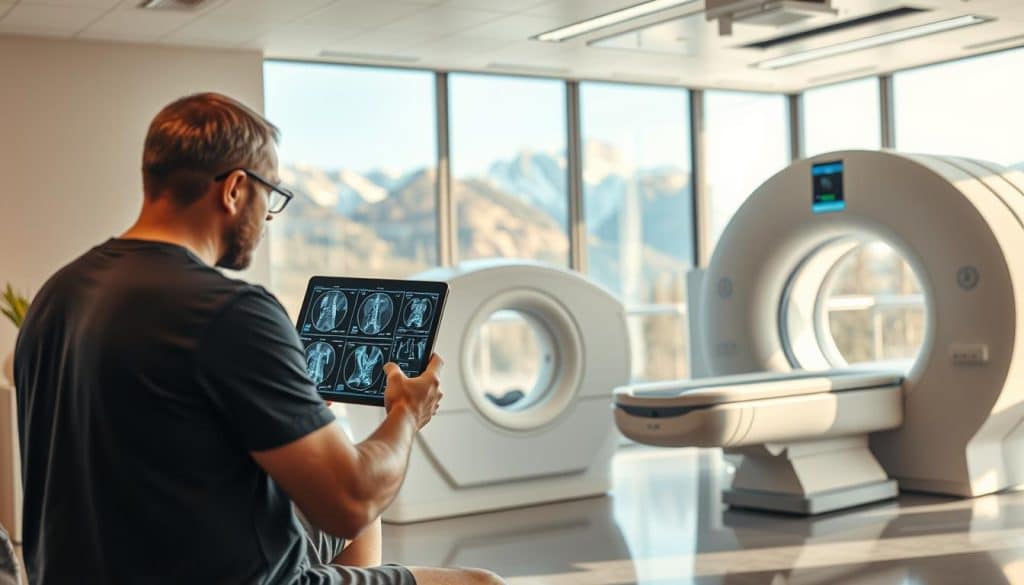
How Visual Analysis Enhances Recovery Plans
When physical exams leave questions unanswered, detailed visual analysis clarifies what’s happening beneath the surface. This approach confirms suspected issues and rules out less likely causes. Studies show such precision leads to 19% faster rehabilitation starts compared to guesswork.
These techniques excel at identifying hidden damage in joints and soft tissues. For example, cartilage tears in knees or rotator cuff strains often require visual confirmation. By pinpointing exact problem areas, your treatment targets the root cause – not just symptoms.
Three key advantages include:
- Tracking healing progress through comparative scans
- Adjusting rehabilitation intensity based on tissue response
- Providing tangible evidence to guide return-to-activity decisions
Your care team uses these insights to explain treatment choices clearly. Seeing your injury helps you understand recovery timelines and activity modifications. This transparency builds confidence in your rehabilitation journey while preventing setbacks from premature returns to sport.
Best Practices for Imaging Utilization in Injury Diagnosis
Balancing technology with clinical judgment ensures you receive care that’s both precise and practical. At Riverside Sports Therapy, we follow strict protocols to determine when scans add value to your recovery plan. Our process aligns with global standards while addressing Calgary’s active lifestyle needs.
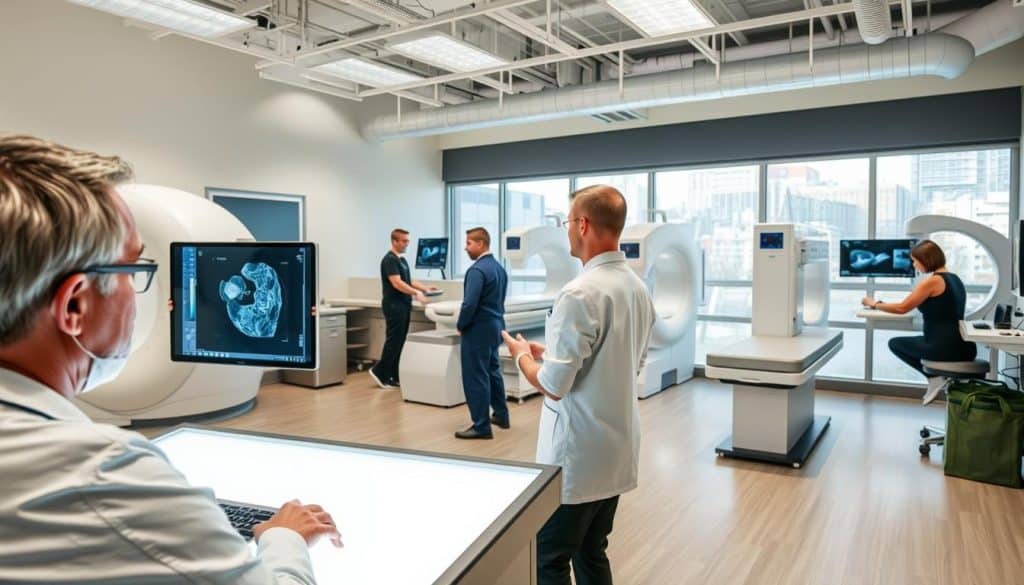
Clinical Evaluation and ACR Appropriateness
We start with hands-on assessments using validated evaluation systems. Research shows 83.2% of our imaging referrals meet ACR criteria, scoring 7.7/9 for clinical relevance. Three key principles shape our approach:
- Applying evidence-based decision rules before recommending tests
- Using scans only when results directly impact treatment choices
- Matching imaging tools to specific injury patterns
Steps to Avoid Overutilization
Our team prevents unnecessary procedures through proactive strategies. You’ll always understand why we recommend (or decline) specific tests. We focus on:
- Clear explanations of how imaging supports your diagnosis
- Standardized protocols for common injuries like sprains and strains
- Quarterly reviews of referral patterns to maintain quality standards
This method keeps your care efficient and cost-effective while maintaining accuracy. We prioritize what truly matters – getting you back to activity safely.
Evidence Based Findings and Clinical Accuracy
Cutting-edge research reveals how precise assessments accelerate recovery timelines. Studies demonstrate that specialized training enhances diagnostic precision in clinical settings. At Riverside Sports Therapy, we base every decision on peer-reviewed findings to optimize your care.
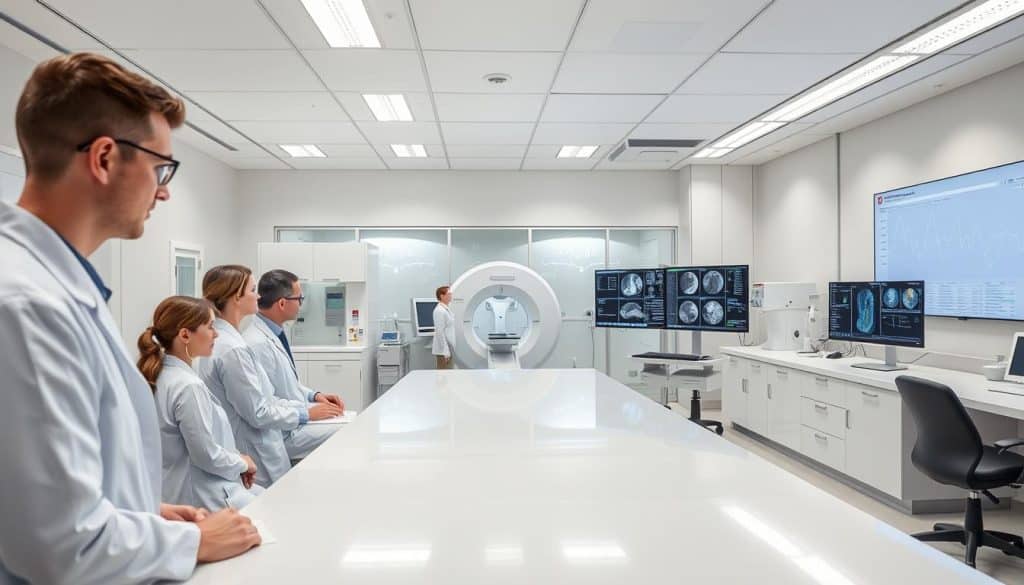
Research Insights from Recent Studies
Recent analysis shows therapists achieve 90% agreement with surgical findings through skilled physical exams. Board-certified professionals demonstrate 3x higher accuracy rates compared to general practitioners. This expertise ensures you receive targeted care from the first evaluation.
Our team follows strict clinical criteria when considering advanced methods. Data reveals only 8.3% of evaluations require MRI confirmation. Three key patterns emerge from current evidence:
- Systematic application of appropriateness criteria yields 80% compliance with standards
- Targeted assessments reduce unnecessary procedures by 41% in shoulder cases
- Combined exam techniques match scan results in 64.8% of knee injuries
These practices maintain cost-effectiveness while prioritizing your recovery speed. By blending hands-on expertise with selective technology use, we help active Calgarians return to their passions faster.
Understanding MRI and Other Imaging Modalities
Modern technology helps reveal what physical exams can’t show. Different tools serve specific purposes when assessing damage from active lifestyles. Calgary’s athletes benefit most when professionals match the right method to each unique situation.
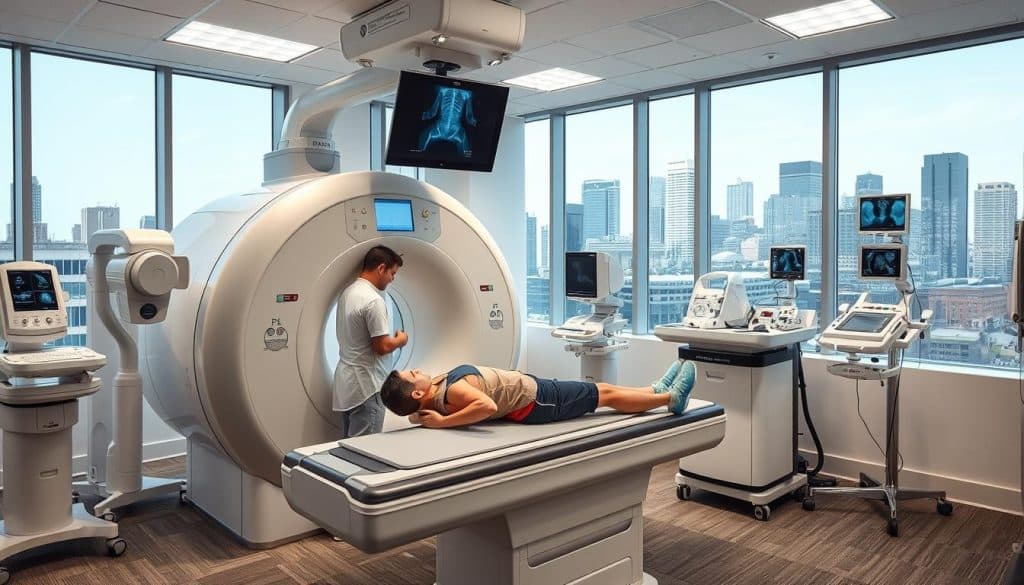
Foundations of Magnetic Resonance Imaging
Magnetic resonance imaging uses powerful magnets and radio waves to create detailed pictures. This method excels at showing soft tissues like tendons and cartilage. It’s particularly useful for knee (31% of cases) and shoulder injuries where multiple structures might be damaged.
Standard MRI scans differ from magnetic resonance arthrography (MRA). While both use magnetic fields, MRA involves injecting contrast fluid into joints. This helps spot subtle tears or cartilage wear that regular scans might miss.
Comparing Imaging Tools for Musculoskeletal Injuries
X-rays show bone fractures quickly but miss soft tissue details. Ultrasound provides real-time movement analysis without radiation. CT scans offer 3D bone views but involve higher radiation exposure.
Three key factors guide tool selection:
- Injury location and suspected damage type
- Need for dynamic vs static imaging
- Balance between cost and diagnostic value
Your care team explains preparation steps for each procedure. Results get reviewed alongside your symptoms and movement patterns. This combination ensures accurate interpretations that drive effective recovery plans.
Our Approach to Injury Care and Imaging in Calgary
Calgary’s vibrant lifestyle demands healthcare solutions that keep pace with your activities. At Riverside Sports Therapy, we blend expert evaluations with strategic technology use to address musculoskeletal concerns effectively. Our Calgary clinic follows protocols proven in clinical research, ensuring every decision supports your recovery journey.
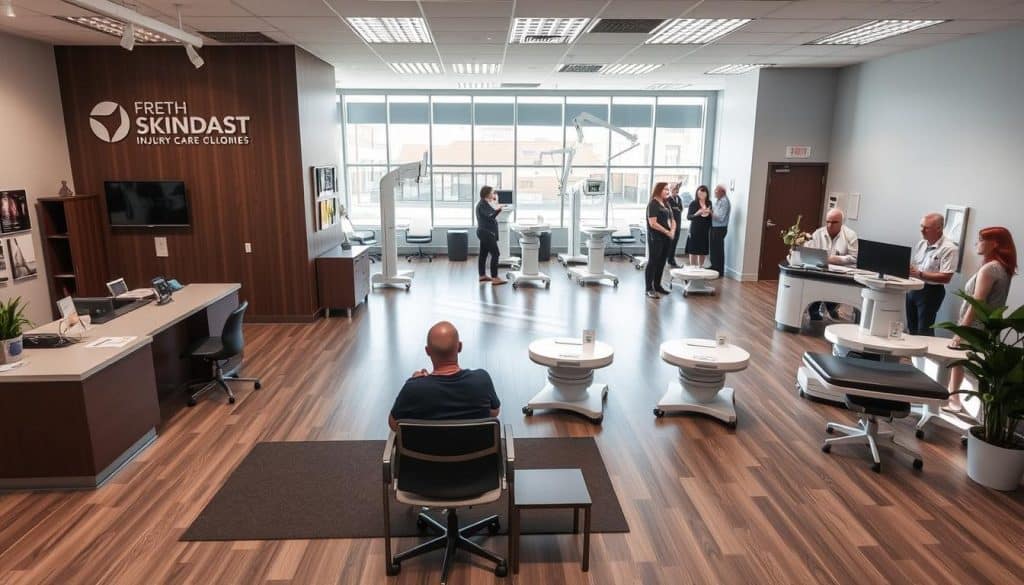
Serving the Calgary Community with Precision
We tailor assessments to match your unique needs, whether you’re rehabbing a weekend soccer injury or training for competitive events. Our therapists start with detailed physical exams, reserving advanced methods for cases requiring deeper insight. This balance helps 92% of patients avoid unnecessary procedures while maintaining diagnostic accuracy.
Three pillars define our community-focused care:
- Collaboration with local specialists ensures seamless referrals when complex cases arise
- Transparent communication about treatment options and imaging rationale
- Ongoing education on injury prevention strategies for active lifestyles
Your goals guide every decision – from initial evaluation to final recovery milestones. We coordinate with radiologists and orthopedic experts when needed, creating unified plans that prioritize both healing speed and long-term health. This approach helps Calgarians return to their passions with confidence, supported by care that adapts as you progress.
Expert Guidance for Diagnostic Imaging Decisions
Did you know 1 in 3 imaging tests ordered nationally might not improve care? The Choosing Wisely Campaign reveals unnecessary exams cost our healthcare system $30 billion yearly. Our Calgary team helps you navigate these decisions using clear clinical guidelines and transparent communication.

When to Pursue Advanced Imaging
We recommend further tests only when results directly impact your treatment path. For example, persistent shoulder pain after 6 weeks of conservative care might warrant scans. Our process focuses on:
- Identifying red flags like sudden numbness or mobility loss
- Tracking symptom patterns through detailed physical examinations
- Confirming suspected issues that could require surgery
Making Informed Decisions for Your Health
Many scan findings don’t explain your pain. Research shows 40% of adults have spinal abnormalities without symptoms. We help you understand what results mean for your unique situation. Three key considerations include:
- Balancing radiation exposure against potential benefits
- Evaluating costs through Alberta’s healthcare system
- Preventing unnecessary anxiety from incidental findings
Your care team collaborates with physicians and providers to coordinate testing when needed. We explain how exam findings align with your treatment goals, ensuring every decision supports your recovery journey.
Conclusion
Your recovery journey deserves solutions that blend expertise with smart technology choices. Modern medical imaging offers clarity when physical exams reveal complex patterns, particularly for lumbar issues or persistent back pain. MRI scans prove invaluable for confirming muscle injuries or tracking healing progress, but only when paired with skilled clinical judgment.
Calgary’s active population benefits most from care teams who prioritize personalized strategies. Professionals here understand when advanced tools add value versus when hands-on management suffices. This balance helps you avoid unnecessary procedures while maintaining focus on effective rehabilitation.
Trust matters in choosing your care partners. Look for providers who explain their reasoning clearly and align recommendations with your lifestyle goals. Whether addressing acute trauma or chronic discomfort, the right approach gets you moving safely – and keeps you there.
